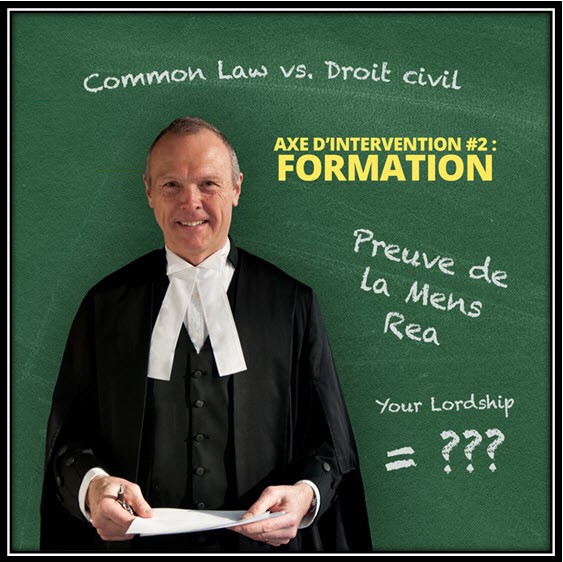Canada has two official languages - English and French. The Canadian Criminal Code guarantees anyone charged with a criminal offence the right to be tried by a judge (or jury, in the case of Supreme Court jury trials) who speaks the official language of Canada that is his or her language. So if you speak English and you were charged in Quebec you could request a trial in English, just as French-speaking people charged in BC can request a trial in French.
When a trial proceeds in French, or in both English and French, the lawyers, court staff, interpreters and judges not only need to be bilingual, but they also need to know the French words for legal terms and expressions. French language training programs for judges are offered in Quebec by the Commissioner for Federal Judicial Affairs , but practice is available closer to home for lawyers and interpreters as well as judicial officers to become more comfortable with French legal terms.
One training opportunity is the mock criminal trial held every spring by L'Association des juristes d'expression francaise de Colombie-Britannique (AJEFCB). Provincial Court Judicial Justice Brent Adair, a regular participant, describes it like this:
“The trial relies on both Provincial Court and Supreme Court judges as adjudicators. A variety of lawyers from across BC, with varying levels of competency in French, act as the defence and prosecution teams, but all share an infectious enthusiasm to improve their ability to plead their cases in French. A "jury" of high school students or bilingual volunteers listens attentively to the twists and turns of the (often) improvised proceedings, each juror forming their own opinion as to the guilt or innocence of the accused.

Judicial Justice Brent Adair in a poster for the AJEFCB mock trial
Although each trial involves a criminal charge, the charge differs every year. Mock trials have involved offences ranging from break and enter and assault to computer fraud and drug importation. Amateur actors and RCMP officers are eager and sometimes unpredictable witnesses. Volunteer interpreters struggle with slang terms from Quebec, or with translating the Spanish testimony of a witness into French. The judge is often faced with having to decide, impromptu, an application to exclude evidence or other unforeseen issue. Motions to dismiss, challenges to expert evidence and objections are routine. And, of course, at the end of it all, there are always impassioned addresses to the jury.
The goal, of course, is to improve one's French, and particularly French legal vocabulary. There is a language monitor who regularly offers comments, corrections, and suggestions to all participants. Unlike many trials these days, the mock trial takes only one day, a Saturday, but it is an intense, high-energy day.
AJEFCB does far more than just an annual mock trial. It offers two-hour evening courses on topics from ranging from family law and bank fraud to practice in the Appeal Courts, guest speakers including Chief Justice McLaughlin and retired BC Court of Appeal Chief Justice Finch, and discussions of hot topics such as physician-assisted suicide and whether Justices of the Supreme Court of Canada must be bilingual - all in French.
AJEFCB also provides legal information and advice, frequently asked questions, and a glossary of legal terms in French on its website.”
For more information on French trials see section 530 of the Criminal Code.

